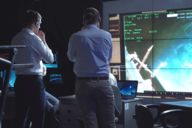
The Munich region is one of the major locations for aerospace technology in Germany and stands out through its extensive scope and depth of sectors. Companies and research institutions are active in aeronautics, space technology, and satellite navigation.
While researchers are performing their experiments up high in orbit in the International Space Station (ISS), down below on Earth, scientific work is being done in parallel. For example, in the Columbus Control Centre at the German Aerospace Center (DLR) in Oberpfaffenhofen near Munich.
The Munich region is one of the major locations for aerospace technology in Germany and stands out through its extensive scope and depth of sectors. Companies and research institutions are active in aeronautics, space technology, and satellite navigation. Alongside the large international firms like the Airbus Group and MTU Aero Engines, the Munich region is also home to many small and medium-sized enterprises. These enterprises with outstanding technical know-how include equipment and component manufacturers like AOA Gauting and RUAG, and technical service providers like ESG (Elektroniksystem- und Logistik-GmbH), Assystem, PFW Aerospace, and IAGB (Industrieanlagen-Betriebsgesellschaft mbH).
The aerospace sector with its intensive research and development activities is closely linked to Munich's enormous scientific potential. Two renowned universities of excellence, the Technical University of Munich (TUM) and the Ludwig-Maximilian-Universität (LMU), and other universities like the University of Applied Sciences and the Universität der Bundeswehr (German Armed Forces University) are all located in the Bavarian capital.
There are many chairs in the aerospace field at the TUM. Areas of research include aviation systems, space technology, and astronomical and physical geodesy. The Munich University of Applied Sciences has a Department of Mechanical, Automotive and Aeronautical Engineering and the Universität der Bundeswehr has a Department of Aerospace Engineering.
The Munich Aerospace – Fakultät für Luft- und Raumfahrt e.V. was founded in 2010 by the TUM, the Universität der Bundeswehr, the German Aerospace Center (DLR) and the Bauhaus Luftfahrt e.V., an internationally-oriented think tank. As a joint research, development and training centre, Munich Aerospace aims to bundle and network competences, and coordinate research, education, and graduate programmes.
The German Aerospace Center (DLR) is represented with nine scientific institutions at the Oberpfaffenhofen site near Munich. The research centre's main fields of activity include climate research, research and development in the field of Earth observation, developing navigation systems and advanced robotics development, whereby the focus is also on how to market the science and technology potential. Based on the number of patent applications, the DLR is one of Germany's 50 most active enterprises and institutions.
Most spectacular for the public is the DLR's participation in space flight missions and astronaut training. The Columbus Control Centre is the DLR's figurehead. It accompanied the Columbia space shuttle mission and today it supports the European Columbus space laboratory in the ISS; for example, the horizon mission with German astronaut Alexander Gerst.
The close-knit research and enterprise scenario in the aerospace field in the Munich region makes the town predestined also for top-notch trade fairs and congresses like the German Aerospace Congress in 2017 and the Aviation Electronics Europe trade fair in 2018. The International Trade Fair for Smart Automation and Robotics, automatica, has already been held six times in Munich. The Messe München will once again host the Inter Airport Europe in 2021 as well as air cargo Europe 2021, the world's largest exhibition and conference for the air cargo industry.
Aviation Electronics Europe